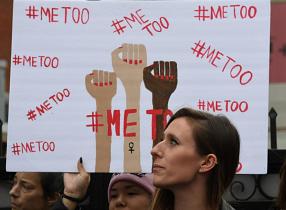On first International Women’s Day since #MeToo went viral, survey asks: Has anything really changed?
The #MeToo movement has taken over Twitter feeds, dominated newspaper headlines, and unleashed a global reckoning for men who exploit their powerful positions to bully, harass and sexually assault women.
But when it comes to changing toxic gender dynamics — the scaffolding that enables everything from high-profile sexual assaults to more quotidian forms of female oppression — has the needle actually moved? According to one recent survey, the answer is yes, even if only by a quiver.
In the lead up to International Women’s Day — the first since #MeToo went viral — non-profit organization Plan International Canada surveyed 3,000 Canadians for their perspectives on a number of gender equality issues. The charity, popularly known for its “Because I Am a Girl” gender equality campaign, wanted to understand whether the #MeToo movement has altered gender perceptions, according to Canadian president and CEO Caroline Riseboro.
The online survey also included questions about women’s experiences. The results painted a bleak but unsurprising picture: six in 10 women said they’ve endured sexual comments from a male colleague or supervisor. Seven in 10 said they’ve fielded sexual comments from total strangers. And women were twice as likely as men to feel that their gender has discouraged or blocked them from pursuing a job, hobby or academic field.
But there were also hopeful glimmers within the survey results, pointing to the potential of social media movements like #MeToo and “Times Up.”
Sixty-seven per cent of survey respondents believed #MeToo has empowered girls and women and roughly half said it’s had a positive impact on workplaces and schools — a finding that echoes a recent Angus Reid poll, where 65 per cent of Canadians said the movement has impacted the way they relate to co-workers.
Sixty-eight per cent also said #MeToo has caused men to re-evaluate how they interact with women; when isolating just male respondents, 67 per cent agreed with this statement.
“Really, the final frontier (to change) is around the deep-seated social norms that we all hold about the power relationships between men and women,” Riseboro said. “And what we’re seeing is that 67 per cent of men are re-evaluating how they interact with women ... I think that is what we’re seeing as a powerful outcome of the #MeToo movement.”
Comments
There are 0 comments on this post





